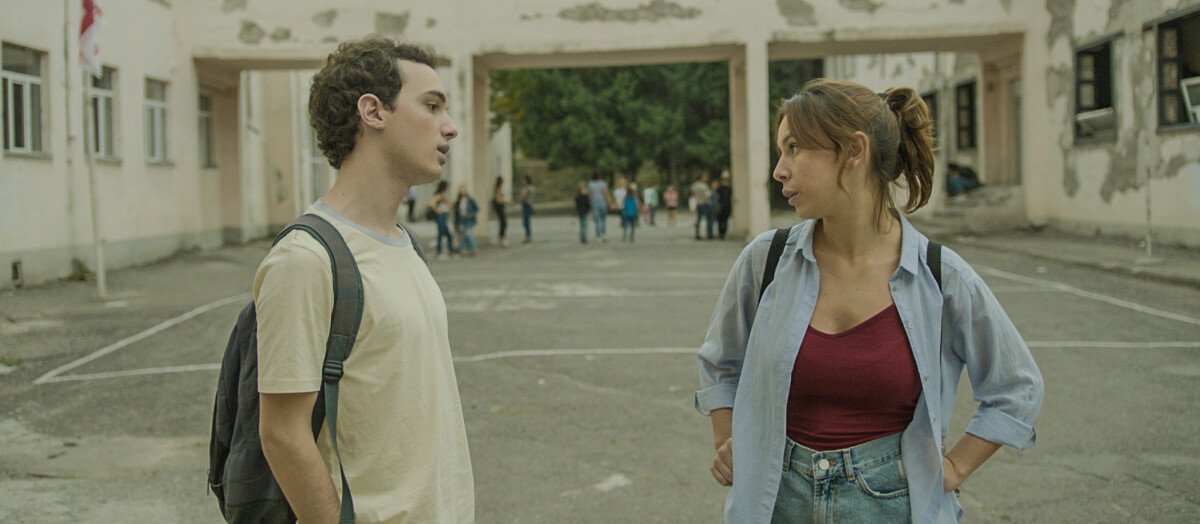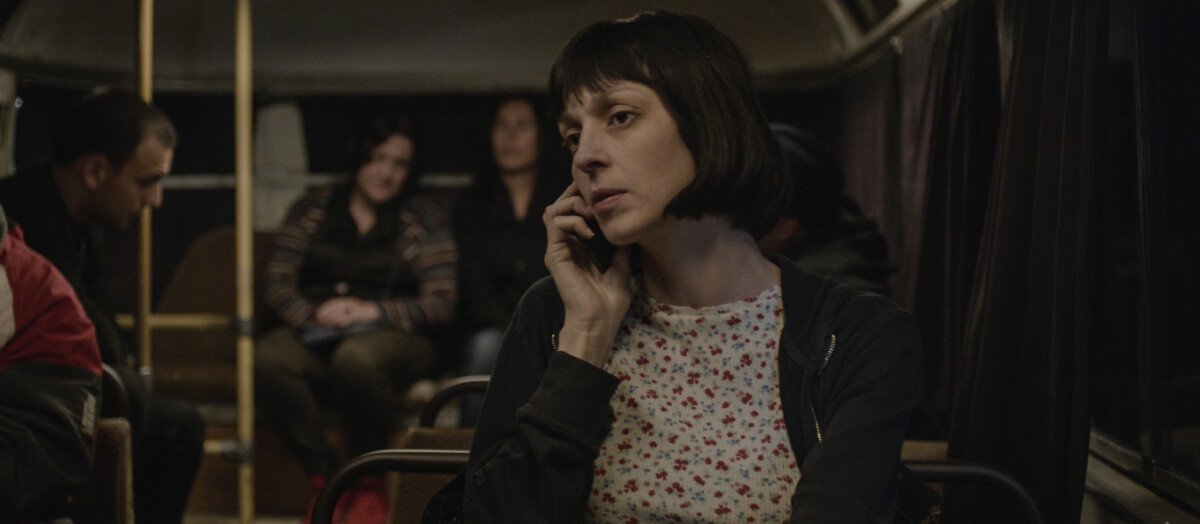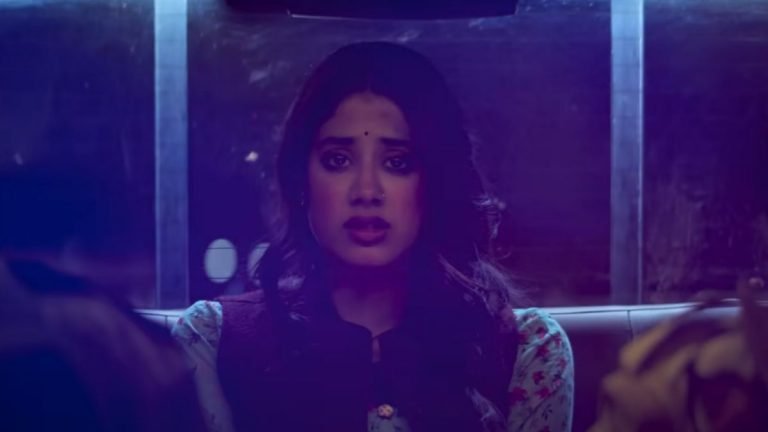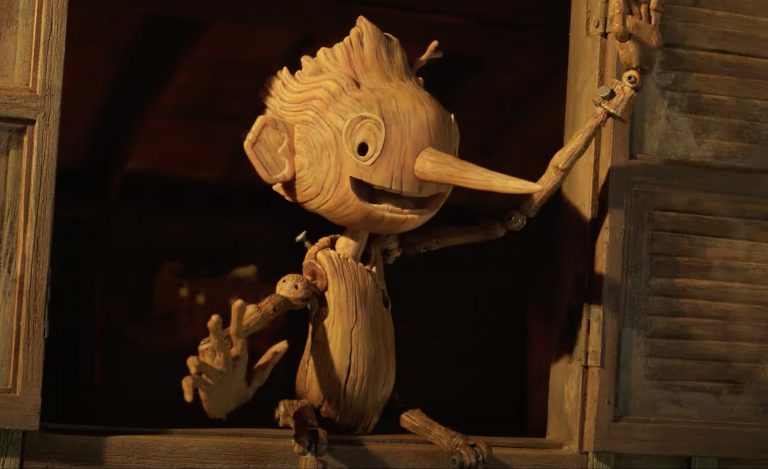Georgian filmmaker Ioseb ‘Soso’ Bliadze’s feature-film debut, Otar’s Death (2021) is an irony-rich social and psychological drama. It’s a tale of two seemingly disparate families though thanks to the corroded social order, their future prospects look uniformly bleak. Single-mother Keti (Nutsa Kukhianidze) and her teenage son Nika (Iva Kimeridze) live in the outskirts of Capital city, Tbilisi. When we first see Keti, she is smartly trying to sell an imported face cream to a middle-aged woman. Keti struggles to make ends meet, but there’s a quiet strength in her that keeps her going.
Nika calls his relatively young mother by her name. He is first seen talking with his girlfriend, Ana (Taki Mumladze) after school. Ana wants them to go to a costume party. However, a little later we see Keti in a party atmosphere, and after a night of drinking she wakes up hung-over. She borrows few bucks from her son, which he gets from a little money box, shaped like an old man toy. They both engage in affectionate and friendly banter, but at the same time there’s restlessness in both of them beneath the surface. Probably, there’s more to that feeling than financial obstacles.
Nika wakes up his weary mum in order to make her keep up the promise she made the night before. They both drive to a lake in the countryside. Once getting to the lake, Keti disappears with her friend. Nika waits till it gets dark, and feeling unhappy over the neglection he decides to drive back alone to Tbilisi. But he calms down and returns back to pickup Keti. While driving in the dark countryside streets, his focus slightly diverted on the mobile, Nika hits an old man and becomes the facilitator of Otar’s death.
Related to Otar’s Death: Wet Sand [2021] ‘Locarno’ Review – A Well-Crafted Microcosmic Tale of Love in a Prejudiced Society
Otar (Marlen Egutia) is cared by his daughter, Tamara (Eka Chavleishvili) and her son, Oto (Archil Makalatia). Tamara views the sudden death of her father, in front of his village home, a prospect for change. Once the local doctor declares the death of Otar, Keti makes a bargain with Tamara to keep Nika out of jail. Keti has just over a day to raise an enormous sum of money. The local cop who is close to Otar’s family also agrees to brush it aside if the money is delivered on time. Raising the money, however, is an arduous task for Keti who has no savings or security. To help his mother travel around Tbilisi, in search of money, Nika rips away the doll money box; the shot of headless old man toy emanates ominous signs.
The bank obviously rejects her request, since they can’t give credit without any collateral. A trip to her family home abruptly ends with a shouting match. Keti, in a fit of desperation, sells her car. But that doesn’t raise much money. Meanwhile, Tamara is eager to start a fresh chapter in life by moving to the city. Oto isn’t happy about the set-up, and he has a cold relationship with his mother, which is a stark contrast to the other mother-son relationship.
Nika meets with Ana. They take a cable car to view the concrete jungle from afar. Ana speaks of her desire to escape the place. Irrespective of urban-rural divide, the desolation and unhappiness plague these downtrodden characters. Situations gets bleak, feelings of disillusionment encircles, and hopes are thwarted, yet there are also unforeseeable surprises and gestures of compassion.
Otar’s death has all the plot elements to elevate it to a melodrama. But Bliadze’s gentle gaze and ironic observation creates a critical distance between the viewers and the characters. Each of the characters is flawed and intensely unhappy, and the titular event triggers certain unfathomable complexities. The focus bestowed upon the rural and urban characters are well-balanced. In fact the characters, although hail from different sociocultural backgrounds, evenly feel constrained in their immediate surroundings. However, the problem isn’t just social and economical. It’s also deeply personal.
Also Read: Gerda [2021] ‘Locarno’ Review – A Metaphysical Drama on Personhood and Modern Society
The stunted emotional growth of both Nika and Oto is as much due to the generational trauma rather than lack of opportunities. Case in point, the unexpected violence and self-destructive behavior we witness in both the young male characters. The mothers themselves are burdened by their emotional baggage. In both Keti and Tamara’s case, the trauma they could have endured is hinted. Tamara works part-time as a choir teacher. She keeps her precious Cello locked in the barn, her only personal space from where she plays the instrument. It’s a space Tamara doesn’t want to be intruded by the men in the family. In another telling scene, when she talks about Otar, crucial information about the past emerges. In Keti’s case, the anxiety is always felt, but we can make strong contextual connections when she goes to meet her old flame, Zaza (Vakho Chachanidze).
Bliadze and his co-writer Elmar Imanov concentrates on the characters’ perspective and often cuts away from the predictable developments. When Keti’s visit to her mom ends in a quarrel, the scenario is abruptly cut. Similarly, Bliadze cuts away from the violent threat Nika faces towards the end at the party. Such attention to the characters’ interiority as well as their gaze rather than the events pushes us to relate with their angst-ridden existence. Moreover, Bliadze diffuses the narrative with a bit of dark and absurdist humor to offset the tragedy. DoP Dimitri Dito Dekanosidze and the sound department also deserve applause for gracefully immersing us into this atmosphere. And despite the unpleasant things the characters go through in the narrative, I found the ending surprisingly calming and hopeful.
Overall, Otar’s Death (107 minutes) is a gripping, nuanced drama that explores the social & generational fault lines in contemporary Georgian society.





![Apostle [2018] Review: Has All the Hallmarks of a Cult Classic](https://79468c92.delivery.rocketcdn.me/wp-content/uploads/2018/10/APOSTLE_HOF_NEFLIX-768x432.jpg)
![Stranger Than Paradise [1984] – A Charmingly Low-Key Classic of American Indie Cinema](https://79468c92.delivery.rocketcdn.me/wp-content/uploads/2019/09/Stranger-Than-Paradise-1984-768x512.jpg)
![7 Prisoners [2021] Netflix Review – An honest drama about human trafficking and the cyclic nature of its psychological traumas](https://79468c92.delivery.rocketcdn.me/wp-content/uploads/2021/11/7_-Prisoners_Prisioneiros_08_00360-768x512.jpg)


